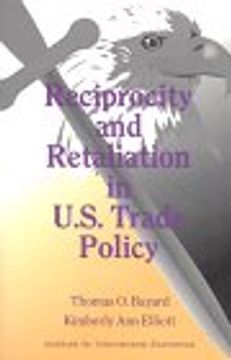Share
Reciprocity and Retaliation in U. S. Trade Policy (Institute for International Economics) (in English)
Thomas Bayard (Author)
·
Peterson Institute For International Economics
· Paperback
Reciprocity and Retaliation in U. S. Trade Policy (Institute for International Economics) (in English) - Thomas Bayard
$ 26.32
$ 35.71
You save: $ 9.40
Choose the list to add your product or create one New List
✓ Product added successfully to the Wishlist.
Go to My WishlistsIt will be shipped from our warehouse between
Monday, May 13 and
Tuesday, May 14.
You will receive it anywhere in United States between 1 and 3 business days after shipment.
Synopsis "Reciprocity and Retaliation in U. S. Trade Policy (Institute for International Economics) (in English)"
Should the United States use retaliatory threats to open foreign markets or deter unfair trading practices? This study reexamines the arguments for and against reciprocity and retaliatory threats in light of actual experience since early 1975, especially the United States' aggressive use of the section 301, special 301, and super 301 provisions of US trade law, which gives the president broad authority to retaliate against "unjustifiable, unreasonable, or discriminatory" foreign trade practices. It analyzes the advantages and disadvantages of these policies and the circumstances under which they are likely to succeed or fail.The study contains an empirical assessment of all section 301 cases concluded between 1975 and 1993. It also provides detailed case studies of various trade conflicts, including the super 301 negotiations involving Japan, Brazil, India, Taiwan, and Korea, financial services disputes with Japan and the European Union, the US-EU conflict over oilseeds, and the US-Japan beef and citrus negotiations. It concludes with an assessment of how the world trading system will change in the aftermath of the Uruguay Round of multilateral negotiations and why it is necessary and desirable for US policy to move from aggressive unilateralism to a strategy of aggressive multilateralism.
- 0% (0)
- 0% (0)
- 0% (0)
- 0% (0)
- 0% (0)
All books in our catalog are Original.
The book is written in English.
The binding of this edition is Paperback.
✓ Producto agregado correctamente al carro, Ir a Pagar.

